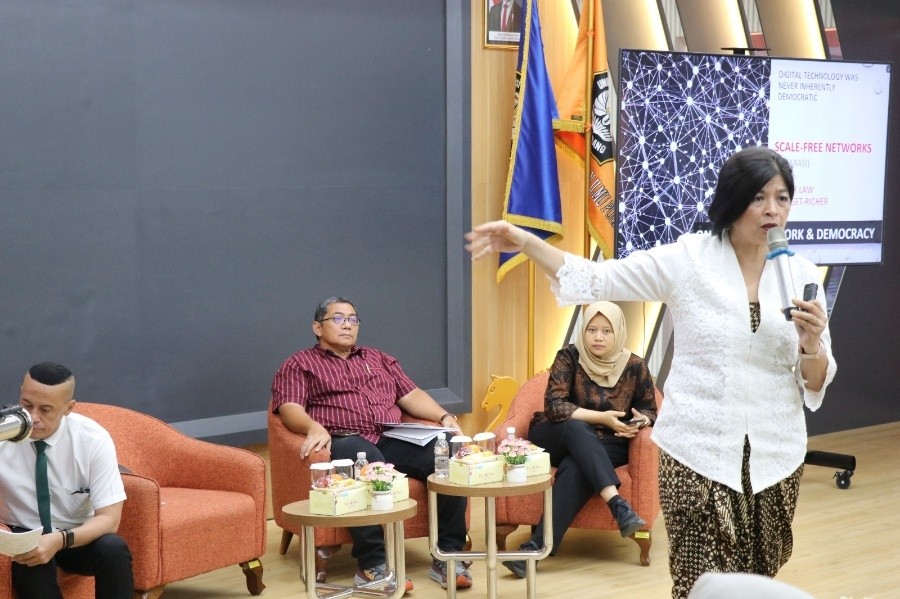UNDIP, Semarang (May 8, 2025) – Diponegoro University’s Faculty of Social and Political Sciences (FISIP UNDIP) reaffirmed its commitment to bridging global and local academic discourse with an international public lecture titled “Social Media and Politics in Southeast Asia.” The event, organized by the Department of Political and Governance Sciences (Departemen Ilmu Politik dan Ilmu Pemerintahan / DPIP), featured renowned expert in digital politics and social media, Prof. Merlyna Lim, Ph.D.
Held on Thursday, May 7, 2025, in the FISIP UNDIP Theater Room, the lecture was followed by a public discussion titled “Understanding the Politics of Social Media Algorithms.” The forum brought together academics, students, and members of civil society to exchange insights.
The event opened with a keynote address from Wijayanto, S.IP., M.Si., Ph.D., UNDIP Vice-Rector for Research, Innovation, Cooperation, and Public Communication, and an expert in digital democracy. In his sharp analysis, Wijayanto, Ph.D., illustrated how the once-promising vision of digital democracy has given way to disappointment. Instead of broadening participation, he argued, social media platforms have been co-opted to silence dissent, spread propaganda, and construct “algorithmic enclaves” that intensify emotional polarization in society.
“Ironically, what was once seen as a free space has become a domain of digital repression,” said Wijayanto, Ph.D. Still, he expressed optimism about the role of civil society in safeguarding a healthy public sphere. “In facing a tsunami of disinformation and opinion manipulation, the future of digital democracy hinges on who controls the technology and how well society builds institutions and norms that promote open and inclusive deliberation,” he added.
The main lecture by Prof. Merlyna Lim blended rigorous academic research with grounded narratives in her distinctive style. She argued that social media algorithms not only create echo chambers but also entrap users in a communication capitalism where personal expression is commodified for likes and shares. “We no longer speak to understand, as Habermas envisioned. We speak to win,” she stated.
Prof. Merlyna explained that social media has become a battleground of power dominated by algorithms, platform capitalism, and a culture of popularity. She warned against the dangers of algorithmic enclaves and affective polarization that threaten the health of digital democracy in Southeast Asia.
She also called on scholars to develop more contextual theories from within Southeast Asia rather than merely importing Western frameworks. She emphasized that the neutrality of technology is an illusion. We need the urge to continue critiquing and the advancement of more transformative digital literacy.
In a press session, Prof. Merlyna stressed the importance of keeping dialogue open and dismantling digital illusions so that the public becomes more critical of the content they encounter on social media.

The subsequent public discussion further enriched the dialogue with Drs. Yuwanto, M.Si., Ph.D. and Dr. Nurul Hasfi, S.Sos., M.A. serving as panelists, moderated by Dr. Agus Naryoso, S.Sos., M.Si. The discussion highlighted how political actors have become adept at manipulating algorithms to shape public opinion. Both speakers underscored the relevance of a critical approach to understanding social media’s role in contemporary political strategy, especially ahead of electoral contests.
Yuwanto, a media and politics expert from DPIP FISIP UNDIP, praised Prof. Merlyna’s new book, calling it a timely guide for researchers in digital democracy and political communication. He also suggested the book would benefit from including a discussion on Artificial Intelligence (AI), a topic expected to grow in importance.
Meanwhile, Dr. Nurul Hasfi, a media sociology and politics researcher from the Department of Communication Science, FISIP UNDIP, commended Prof. Merlyna’s approach. She viewed the book as a critical reflection on political communication in the digital era. This book reminds elites and the state to use social media ethically—not just as a campaign tool but as a means to educate a democratic society.
For political media managers and campaign teams, she added, the book offers a cautionary guide against relying solely on viral strategies that risk deepening public division. “Meanwhile, for digital literacy activists, it is a vital resource for fostering public awareness and encouraging more critical and responsible media use,” said Dr. Nurul.
Representing the Dean of the UNDIP’s Faculty of Social and Political Sciences, Vice Dean I S. Rouli Manalu, S.Sos., MCommSt., Ph.D., delivered closing remarks, emphasizing the faculty’s appreciation for the event. “Social media is no longer a neutral space; it can be a tool of power that undermines democracy. This lecture is part of FISIP’s effort to build synergy between classrooms, communities, and a rapidly evolving global landscape,” she noted.
Through forums like these, UNDIP continues to promote critical consciousness and analytical capability, especially as society becomes increasingly entangled in algorithmic logic. The world is changing, and so is the nature of power. Events like this aim to help students, academics, and the public develop a critical awareness of the new forms of power embedded in the technology they use daily.
The event drew hundreds of participants, including students and faculty members, who were not only present but actively engaged in critical discourse—demonstrating that academia remains a strategic space for shaping the future of democracy and technology. (Public Communication / UNDIP / DHW & TSA, ed. NH)